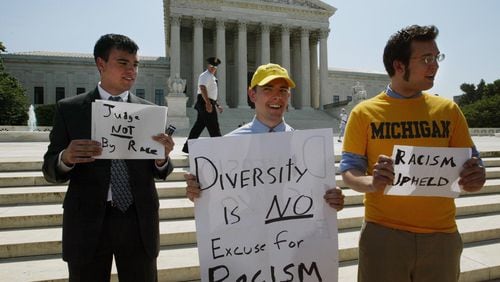Many people cheered the news last week that the Trump White House reversed Obama-era policies designed to foster greater racial diversity on America’s college campuses, contending students should only be admitted on academic merit.
They wouldn’t necessarily applaud the outcome if academics became the sole criteria: overwhelmingly female campuses.
Girls outperform boys across the country, which is why more than 56 percent of college students today are women. Admissions directors have acknowledged bypassing more qualified females to admit enough males for gender balance; neither young women nor young men want to attend a school that’s nearly all female.
Colleges want a mix of students and make allowances to achieve that goal. Colleges seek running backs, math scholars, tuba players, ballet dancers and yodeling champions. The admissions process aims to generate a well-rounded and diverse class of students with varied interests and backgrounds.
As recently as 2016, the Supreme Court affirmed that colleges can use affirmative action “to promote diversity, but they need to be very careful about it and revisit it,” said Carl Tobias, a law professor at the University of Richmond. “That is the law of the land right now, but there is a fair amount of pressure to change that.”
The new Supreme Court member chosen by President Donald Trump to replace retiring Justice Anthony Kennedy, a crucial swing vote and author of the 2016 opinion upholding affirmative action, could tip the scale.
While people want the admission process to operate as a meritocracy, Tobias pointed out in an interview it is not, noting the extra weights given for athletics, geography, legacy and a host of other factors. As an AJC investigation revealed a few years ago, the 2014 freshman class at Georgia Tech had an average SAT score of 1445. However, for incoming football players, the average SAT was 420 points below the class as a whole. Gaps were also found among athletes at the University of Georgia, Georgia State and Georgia Southern.
No one in the Georgia Legislature, the U.S. Congress or the White House is speaking out against admissions breaks for football players. Nor are any members of Congress railing against the edge accorded legacies or the children of lawmakers, celebrities or donors.
All the indignation falls on minority students, who, for their so-called advantages, still remain underrepresented in the nation’s elite schools. Georgia public colleges don’t consider race in admissions, the result of a 2001 case in which an appeals court ruled a University of Georgia program considering race was unconstitutional.
People seldom complain about students gaining admission because their grandparents wrote a big donation check. “It is not unconstitutional, whereas affirmative action is close to the line on constitutionality,” Tobias said. That Americans fixate on skin color over all the other concessions in college admissions speaks to race as an ongoing flashpoint, he said, adding, “I don’t know how you get beyond that.”
In rescinding the affirmative action guidance, the U.S. Education and Justice Departments maintain the federal government had overstepped and advocated “policy preferences and positions beyond the requirements of the Constitution.” The reversal reflects a general retreat by the administration from policies that pressure K-12 schools and higher education to scrutinize their practices through a lens of racial bias.
A year ago, Attorney General Jeff Sessions said affirmative action in college admissions constituted racial discrimination, and his agency may seek to prosecute it. Last week, the U.S. Department of Education announced it would postpone the imposition of an Obama-era rule mandating states review how school districts identify and serve minority students with disabilities. Scheduled to go into effect this fall, the rule was enacted because evidence showed minority students in special education were disproportionately disciplined and placed in more restrictive settings.
Former U.S. education secretaries criticized the civil rights retreat, including John King, now with the advocacy group Education Trust: “More than 60 years later, our nation still has not fulfilled the promise of Brown v. Board of Education. With each passing day, our country grows more diverse, and despite deeply misguided calls for building walls, the simple truth is we cannot build walls high enough to separate one child’s destiny from that of another.”







